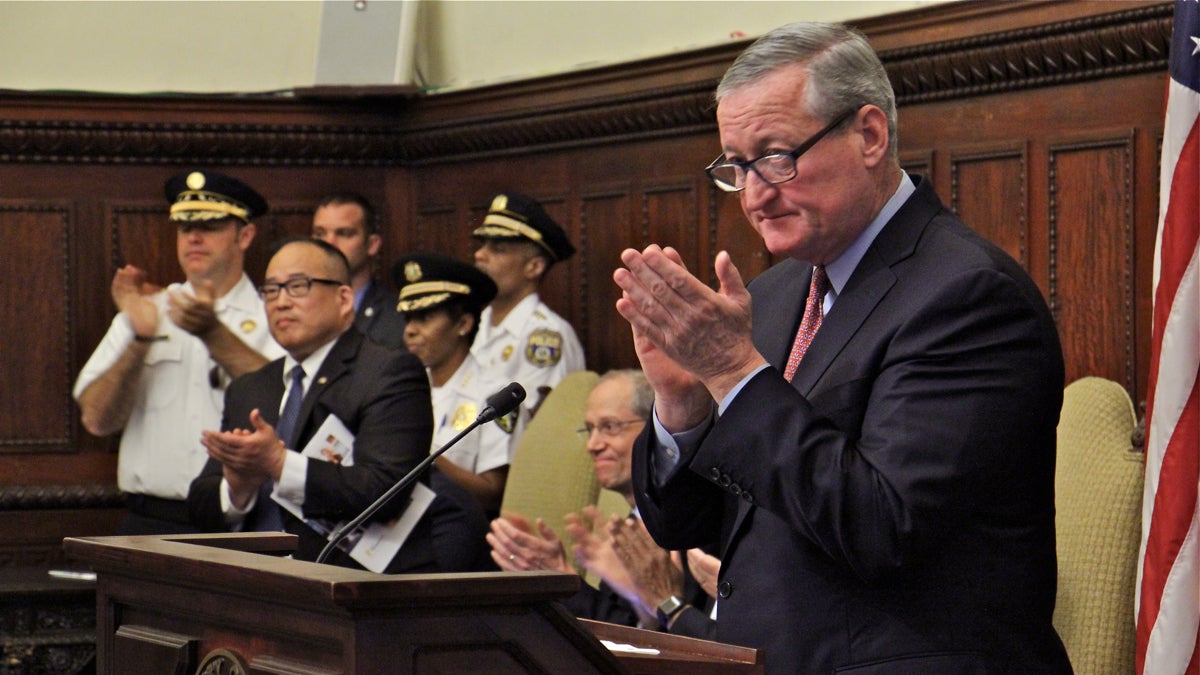Philly opioid task force issues recommendations, but skips ‘safe injection sites’

Philadelphia Mayor Jim Kenney applauds the efforts of the Task Force to Combat the Opioid Epidemic in Philadelphia. (Emma Lee/WHYY)
The Mayor’s Task Force to Combat the Opioid Epidemic in Philadelphia announced eighteen recommendations to halt the crisis Friday. Last year, three times as many people died from opioid overdoses here than from homicide.
While releasing the recommendations, Mayor Jim Kenney said that Philadelphia families can’t afford inaction. He said that fighting it will require a comprehensive, citywide approach. Pennsylvania Gov. Tom Wolf, who attended the event, echoed that sentiment on a larger scale.
“This task force is really important, because this is not a Philadelphia problem, this is a Pennsylvania problem. We have an epidemic,” Wolf said.
The recommendations focus on four key areas; prevention and education, treatment, overdose prevention, and the criminal justice system.
Thomas Farley, the city’s health commissioner, co-chaired the task force. He says that there is widespread consensus the epidemic is being fed by over-prescribing pain pills.
“Physicians and health care providers need to provide fewer opioids to fewer patients in lower doses and in shorter durations,” Farley said, adding that the recommendations encourage educating doctors and consumers about these drugs and establishing insurance policies that support safer opioid prescribing standards.
Arthur Evans, the city’s former commissioner of Behavioral Health and Intellectual Disability Services, says that officials can’t “treat their way out of this problem.”
“As a treatment professional, I know that having treatment available is only one part of the challenge. A bigger challenge is getting people to go to treatment. Ninety percent of people in this city who have an addiction are not in treatment, and 80 percent of them don’t believe they need to be in treatment,” Evans said. “That’s what the national figures say. And so we have to do something to educate the community, to educate people, to reduce stigma.”
The recommendations also encourage a wider spread use of the anti-overdose drug naloxone, sometimes called Narcan. Farley said he’d like to see SEPTA police start to carry it.
Another recommendation encourages the city to continue exploring safe injection sites — places where people can use illegal drugs with medical personnel on stand-by in case of an overdose.
Farley says Canada has found success with that approach, but also that a host of legal challenges would act as a barrier here in the states.
He says the recommendations are realistic and could make a real difference, but not overnight.
“This crisis took years to develop, it’s going to take years for us to turn it around,” he said.
WHYY is your source for fact-based, in-depth journalism and information. As a nonprofit organization, we rely on financial support from readers like you. Please give today.

